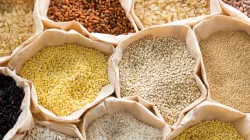From Millets to Chickpeas: Include THESE 5 coarse grains in your diet, know benefits of winter superfoods
High Fiber Grains: These improve digestion and keep the immune system strong. Let us know how to include these coarse grains in your diet in winter and what are their benefits.

Jowar, bajra, ragi, chana are called coarse grains, but they are not limited to this only, they are also called winter superfoods. That is also because they have a good amount of protein, iron, fiber, and calcium. The name may be coarse but experts believe that eating them does not make the body expand, that is, you do not become fat but healthy. They improve digestion and keep the immune system strong. Let us know how to include these coarse grains in your diet in winter and what are their benefits.
1. Millets
It provides warmth to the body in winter. Millet is rich in fiber, iron, calcium, and zinc, which helps in strengthening the bones. It also helps in dealing with diabetes, heart disease, and digestive problems. It helps in controlling blood pressure and also keeps weight under control. In the winter season, you can make and eat millet khichdi, paratha, and dhokla.
2. Jowar (Sorghum)
Consumption of jowar is also beneficial for health in winter. It contains essential nutrients like protein, iron, fiber, and calcium. Jowar especially helps in weight loss. It is also ideal for a gluten-free diet. Eating jowar improves heart health and also controls cholesterol levels in the blood. Jowar rotis, jowar upma, and jowar halwa can be easily eaten in winter.
3. Ragi
Ragi is also counted as a coarse grain, it provides warmth to the body in winter. It helps in controlling weight and improves digestion. Consumption of ragi is also helpful in increasing muscle strength and controlling blood sugar levels.
4. Urad dal
Urad dal also comes in the category of coarse grains and its consumption in winter gives extra energy to the body. It is rich in protein, fiber, and iron. Urad dal improves digestion. Its consumption also fulfills the deficiency of blood in the body and strengthens the immune system.
5. Chickpeas
Chickpeas are rich in protein, fiber, and zinc. It helps in maintaining good digestion, preventing heart disease, and keeping the body temperature balanced.
They are rich in carbohydrates, proteins, and lipids, as well as bioactive protective phytochemicals and micronutrients, according to a report published in 2016 in the National Library of Medicine. They have a low glycemic index. When eaten raw (e.g., nuts and seeds) or only minimally processed (e.g., muesli), they usually retain their food structure for a long time during the digestive process.
So in this way, this superfood controls the cholesterol level in the body maintains the energy of the body, and also keeps the stomach healthy. Apart from this, these grains are also beneficial for the health of skin and hair.